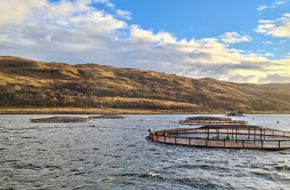Highlights
- Installation of a hybrid battery/diesel system to power equipment on its Loch Spelve Fish Farm on Mull.
- Use of LED lighting
- Monitoring system that provides real time data
- Testing suitability on five other salmon farms
- Further efficiency and CO2 reduction measures being taken and being trialled.

Improvements at Loch Spelve Fish Farm, Mull
Salmon farms rely on diesel generators to power all the equipment necessary for feeding, lighting, aeration and monitoring of the sites. Scottish Sea Farms have now trialled a newly developed hybrid system which combines diesel and battery power.
During times of high power demand, such as during feeding for example, the diesel generator powers the systems and charges the battery at the same time. When demand is low, the battery takes over and the diesel generator can shut down. This is all controlled by a system that monitors the power demand and can switch between diesel and battery, to optimise energy use.
The system is capable of being configured to operate effectively for the particular energy demands of different sites. By reducing the time that the diesel generator operates, overall savings can be made in fuel consumption.
Scottish Sea Farms are now looking to expand the use of the hybrid system across more of their farms around the coast of Scotland.
As well as trialling the hybrid power system, Scottish Sea farms have trialled the use of LED lighting at Loch Spelve. These are rated at 100w lights and replace 400w metal halide bulbs. They provide the same benefits to the farmed salmon but reduce carbon emissions and costs at the same time.
Other initiatives
In other sites, Scottish Sea Farms have other initiatives designed to cut carbon:
- Increasing the uptake of company-owned electric vehicles by installing electric charging points at the three mainland facilities.
- Company-wide ‘Cycle to work’ scheme, with help towards the cost of buying a bike.
- At the Barcaldine Hatchery, the installation of a biomass system to provide heat and hot water (saving 683 tonnes of carbon a year compared with using oil, equivalent to the greenhouse gases of 6million road miles per year), along with motion sensitive lighting internally and wind and solar powered lighting externally, and provision for the future installation of a hydro scheme.
- Replacing single-use polystyrene packaging with returnable, re-usable bulk bins with the support of the company’s UK retail customers M&S and Waitrose, and now exploring workable alternatives for the export market.
- Trialling a new aeration system that is capable of boosting water quality in salmon pens whilst using 56% less diesel than traditional systems, reducing CO2 emissions by as much as 700 tonnes per unit installed (the equivalent of taking 138 passenger vehicles off the road for one year).
- Repurposing fish waste from the Barcaldine Hatchery into nutrient-rich agricultural fertiliser.
- Ensiling category 2 waste (fish mortalities), for repurposing as carbon neutral fuels, organic fertilisers, crop growth stimulants and green energy feedstocks.
- Capturing category 3 waste (viscera), for use in pet food, shrimp feed, and speciality pig and poultry feed additives.
- Deploying new sensor technology to monitor electricity and water consumption within processing, with a view to identifying opportunities to reduce the company’s usage of both.
Scottish Sea Farms provide employment in rural areas that have been hit by depopulation in recent years. Of the 507 staff currently employed, 38 are undertaking Modern Apprenticeships - this supports the Developing Young Workforce groups in the regions where they operate.
The company are committed to buying local, where possible, to support local economies, and through contracts valued at over £100million annually have supported businesses from sectors such as engineering, manufacturing, fish feed and B&Bs.
Through their initiative “Heart of the Community”, Scottish Sea Farms have provided over £1.5million grants to local groups and charities, with the staff local to a particular area being involved in reviewing grant applications.
Staff also participate in local actions, such as beach cleans, and the company also have provided donations and equipment to local organisations such as food banks, primary school children (high visibility vests), local care home teams (face masks) and NHS sites (suits, sanitiser, protective glasses, toiletries).